![]()
|
British
Anchor Pottery Co Ltd |
Location and period of operation:
|
British
Anchor Pottery Co Ltd |
Longton |
1884
|
1970 |
|
Earthenware manufacturer, Anchor Road, Longton, Stoke-on-Trent. British Anchor Pottery used Rawland & Marsellus Co for exports to America
Takeovers:
|
Previously: J T Hudden
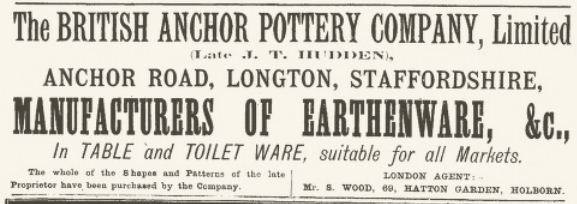
The British Anchor Pottery
Company Limited
( Late J T Hudden)
Anchor Road, Longton, Staffordshire
Manufacturers
if Earthenware, &c.,
in Table and Toilet Ware, suitble for all markets
The whole of the Shapes and patterns of the late
Proprietor have been purchased by the Company
The Pottery Gazette, January 1885
|
photo courtesy: Martin Warrilow |
the registration diamond
shows that the pattern was registered on the 31st March 1881
|
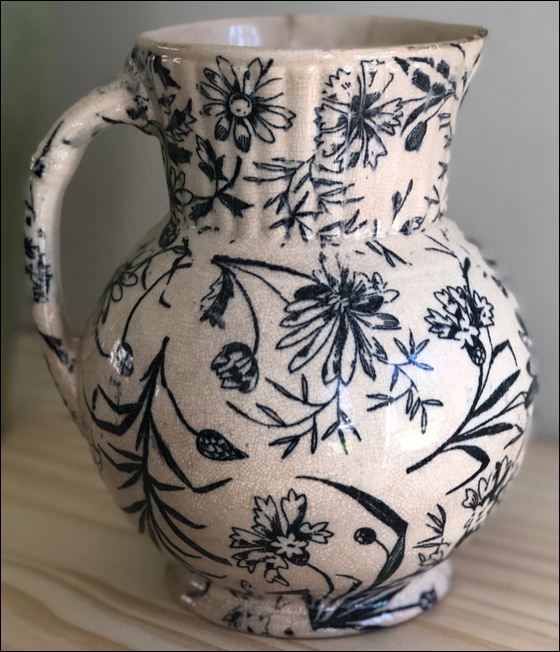
jug - pre 1891
courtesy: Jessica Brooks

Plate in the JAPAN pattern
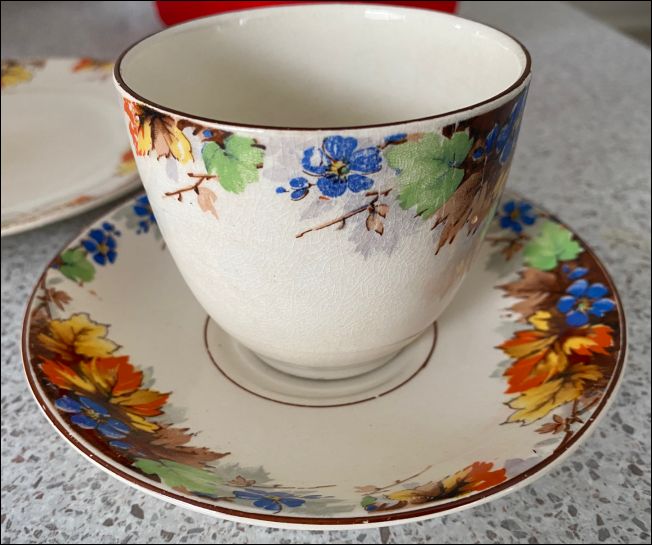 |
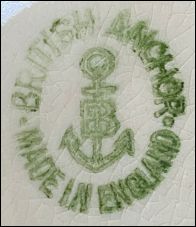 British Anchor Made in England
|
photos courtesy:
Steven Carpenter

1960's - 70's coffee set in the
Impact pattern
|
Hostess Table Ware British Anchor Pottery introduced the Hostess Table Ware brand name in 1961. Some existing patterns, such as the traditional "Merrie Olde England" were included in the Hostess range. These were produced alongside contemporary designs, some of which were designed by John Russell.
|
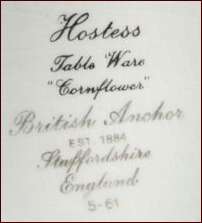
Hostess Table Ware
British Anchor
EST 1884
Staffordshire
England
5-61
[note the date code 5-61 for May 1961]
Cornflower is a pattern name
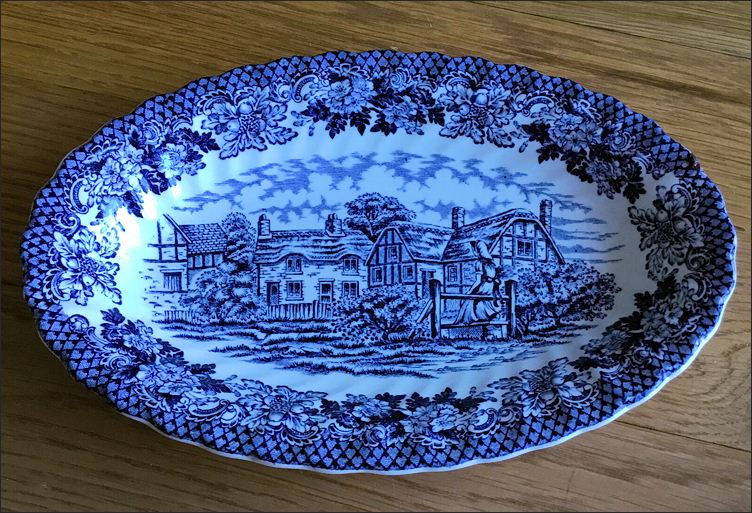 |
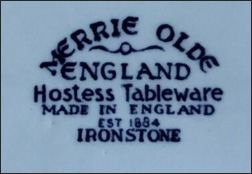 Merrie Olde England Hostess Table Ware Made in England EST 1884 Ironstone |
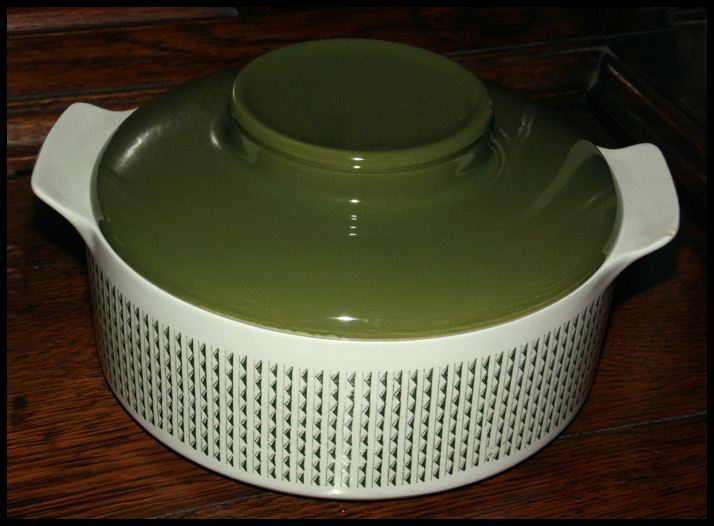
1960's 'Debonair' Hostess
Casserole
British Anchor Pottery
introduced the
Hostess brand name in 1961
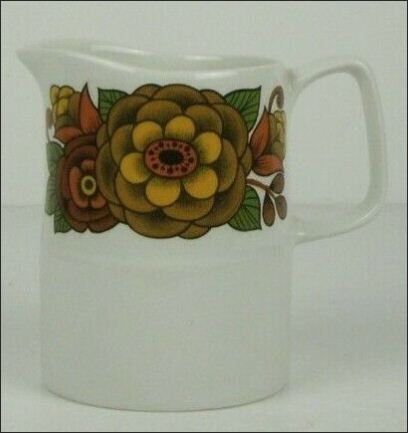 milk jug in the Camelot pattern - designed by John Russell this pattern continued to be made by Hostess Tableware Ltd |
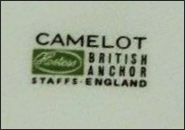 CAMELOT Hostess British Anchor Staffs - England |
Marks & Initials used on ware for identification:
B A P C LTD
B A P Co LTD
BRITISH ANCHOR
BRITISH ANCHOR
POTTERY
mark used 1910 onwards
REGENCY
[introduced
1952+]
MONTMARTRE WARE
[introduced
1954+]
RICHMOND
[introduced
1958+]
HOSTESS TABLE WARE
[introduced
1961+]
TRIANON WARE
[introduced
1961+]
often a crown is used - associated with the name "BRITISH ANCHOR"
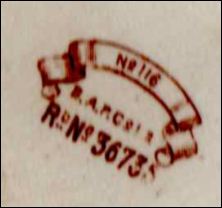
B A P
Co Ltd
the registration number dates
from 1885
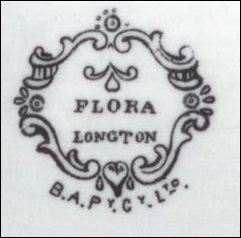
B A PY
CY Ltd
LONGTON is the town where the
pottery works was located
FLORA is the pattern name
courtesy: 'Staffordshire Potters 1781-1900' R K Henrywood
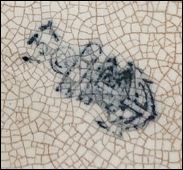
1884 to 1891 |
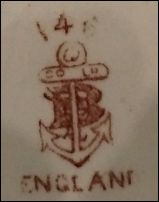
1891 to 1913 |
early marks with the letters BPL
intertwined over an anchor
"ENGLAND" added from 1891
the numbers appearing above the
mark are likely
to be pattern numbers
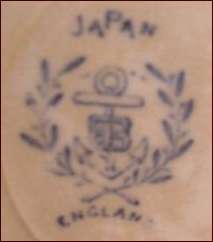
JAPAN is the
pattern name
mark used 1913-40
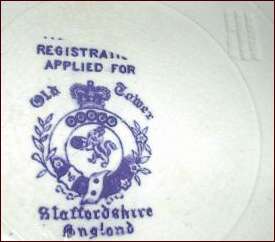
printed mark together with
impressed mark "BRITISH
ANCHOR"
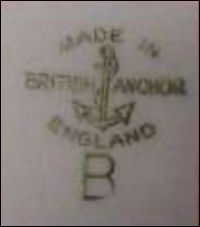 |
 |
British Anchor
Made in England
this style of anchor mark used 1945+
and appears to have been replaced by
a crown mark in the early to mid 1950s
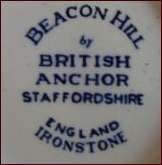
mark used 1945+
[the name of differing patterns appears with this standard mark]

mark used 1954+
[note the date code 12-58 for December 1958]
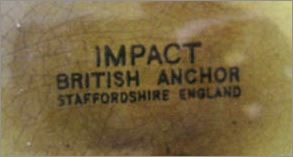
British Anchor
Staffordshire England
IMPACT is the pattern name
mark 1960's - 70's
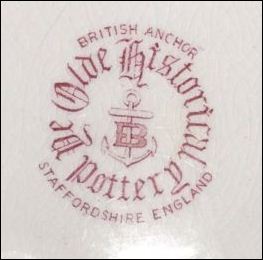
British Anchor
Staffordshire England
Ye Olde History Pottery
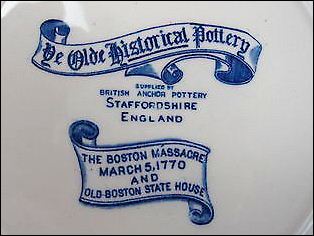
Ye Olde History Pottery
supplied by
British Anchor Pottery
Staffordshire
England
British Anchor introduced a
series of historic scenes and
Willow style plates and cup & saucer sets under
the name 'Ye Olde Historical Pottery'
probably the 1960s
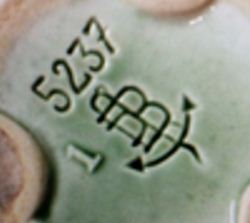
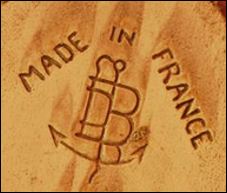
impressed
mark
although these marks look
similar to the british Anchor mark
they are from Gustave
De Bruyn in Fives, Lille, France
|
Blue bird pattern ware In 1922 A. E Jones introduced a range of ware featuring stylised blue birds in flight on a light blue background with white clouds. Hollow ware usually had a silvered lid or rim. The registration number 693121 shows that the pattern was first registered in 1922. Ware appears with and without the stylised initials 'GF.B' British Anchor Pottery also produced the same pattern - on ware produced by them a small anchor appears underneath the initials 'GF.B', sometimes accompanied by a mark with the letters BPL intertwined over an anchor. The initials 'GF.B' have sometimes, mistakenly, been attributed to George Frederick Bowers. Although the owner of the initials is unknown. |

lidded biscuit barrel in the
stylised blue bird pattern
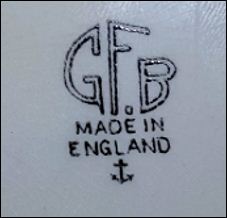 GF.B Made in England |
 GF.B Made in England |
marks on the blue bird
pattern produced by British Anchor Pottery
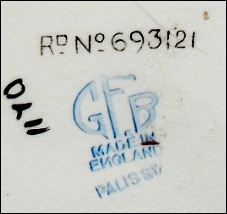
Rd No 693121
GF.B
Made in
England
Palissy
mark on the identical blue bird pattern produced by Albert E Jones
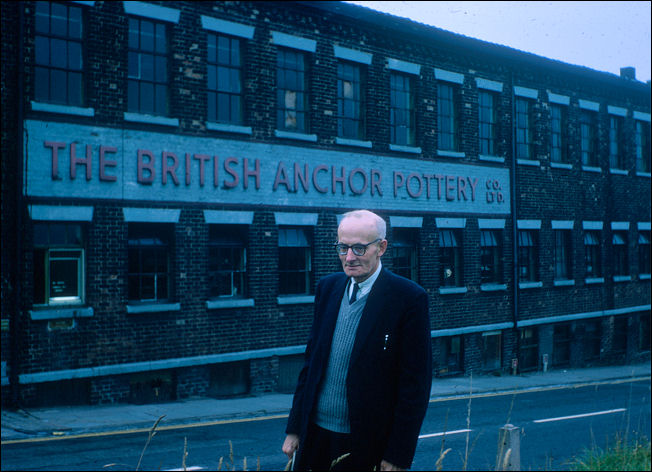
One of the
parishioners of the nearby St. James Church
outside The British Anchor Pottery works in Anchor Road
photo: 1960's

the British Anchor Pottery at
the corner of Anchor Road and Bath Street
The British Anchor Pottery is shown by the dark blue rectangle
The
works of Sampson Bridgwood
& Son (also called the Anchor Pottery)
is marked by the light blue circle
(map is combination of 1898 and 1922 maps)
Questions, comments, contributions: email: Steve Birks